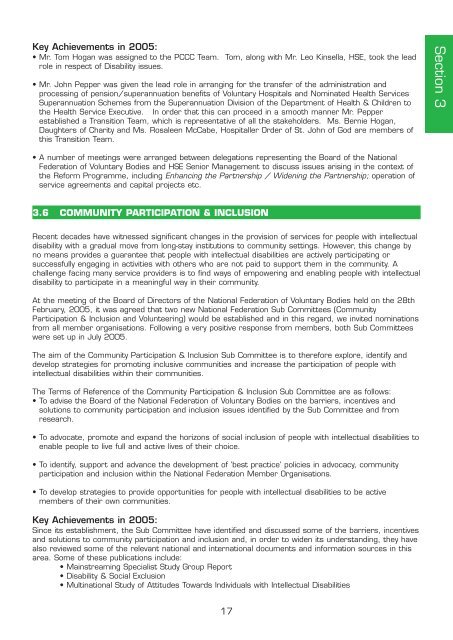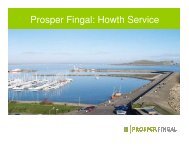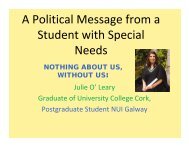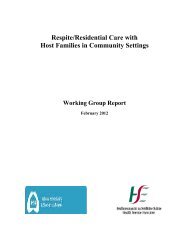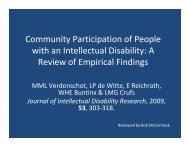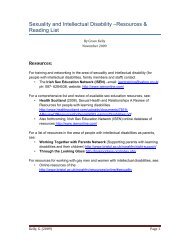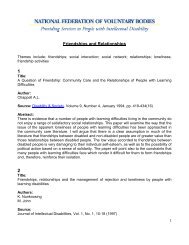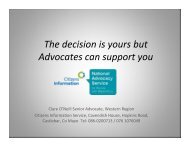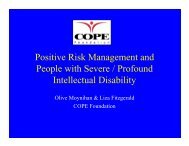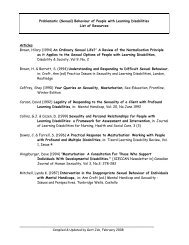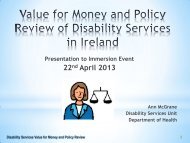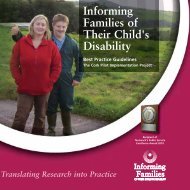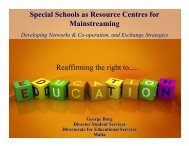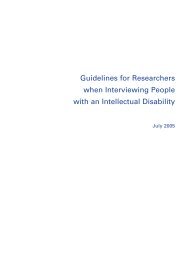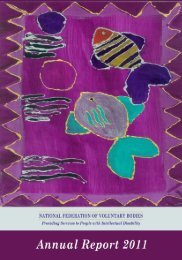Annual Report 2005 - National Federation of Voluntary Bodies
Annual Report 2005 - National Federation of Voluntary Bodies
Annual Report 2005 - National Federation of Voluntary Bodies
You also want an ePaper? Increase the reach of your titles
YUMPU automatically turns print PDFs into web optimized ePapers that Google loves.
Key Achievements in <strong>2005</strong>:<br />
• Mr. Tom Hogan was assigned to the PCCC Team. Tom, along with Mr. Leo Kinsella, HSE, took the lead<br />
role in respect <strong>of</strong> Disability issues.<br />
• Mr. John Pepper was given the lead role in arranging for the transfer <strong>of</strong> the administration and<br />
processing <strong>of</strong> pension/superannuation benefits <strong>of</strong> <strong>Voluntary</strong> Hospitals and Nominated Health Services<br />
Superannuation Schemes from the Superannuation Division <strong>of</strong> the Department <strong>of</strong> Health & Children to<br />
the Health Service Executive. In order that this can proceed in a smooth manner Mr. Pepper<br />
established a Transition Team, which is representative <strong>of</strong> all the stakeholders. Ms. Bernie Hogan,<br />
Daughters <strong>of</strong> Charity and Ms. Rosaleen McCabe, Hospitaller Order <strong>of</strong> St. John <strong>of</strong> God are members <strong>of</strong><br />
this Transition Team.<br />
• A number <strong>of</strong> meetings were arranged between delegations representing the Board <strong>of</strong> the <strong>National</strong><br />
<strong>Federation</strong> <strong>of</strong> <strong>Voluntary</strong> <strong>Bodies</strong> and HSE Senior Management to discuss issues arising in the context <strong>of</strong><br />
the Reform Programme, including Enhancing the Partnership / Widening the Partnership; operation <strong>of</strong><br />
service agreements and capital projects etc.<br />
3.6 COMMUNITY PARTICIPATION & INCLUSION<br />
Recent decades have witnessed significant changes in the provision <strong>of</strong> services for people with intellectual<br />
disability with a gradual move from long-stay institutions to community settings. However, this change by<br />
no means provides a guarantee that people with intellectual disabilities are actively participating or<br />
successfully engaging in activities with others who are not paid to support them in the community. A<br />
challenge facing many service providers is to find ways <strong>of</strong> empowering and enabling people with intellectual<br />
disability to participate in a meaningful way in their community.<br />
At the meeting <strong>of</strong> the Board <strong>of</strong> Directors <strong>of</strong> the <strong>National</strong> <strong>Federation</strong> <strong>of</strong> <strong>Voluntary</strong> <strong>Bodies</strong> held on the 28th<br />
February, <strong>2005</strong>, it was agreed that two new <strong>National</strong> <strong>Federation</strong> Sub Committees (Community<br />
Participation & Inclusion and Volunteering) would be established and in this regard, we invited nominations<br />
from all member organisations. Following a very positive response from members, both Sub Committees<br />
were set up in July <strong>2005</strong>.<br />
The aim <strong>of</strong> the Community Participation & Inclusion Sub Committee is to therefore explore, identify and<br />
develop strategies for promoting inclusive communities and increase the participation <strong>of</strong> people with<br />
intellectual disabilities within their communities.<br />
The Terms <strong>of</strong> Reference <strong>of</strong> the Community Participation & Inclusion Sub Committee are as follows:<br />
• To advise the Board <strong>of</strong> the <strong>National</strong> <strong>Federation</strong> <strong>of</strong> <strong>Voluntary</strong> <strong>Bodies</strong> on the barriers, incentives and<br />
solutions to community participation and inclusion issues identified by the Sub Committee and from<br />
research.<br />
• To advocate, promote and expand the horizons <strong>of</strong> social inclusion <strong>of</strong> people with intellectual disabilities to<br />
enable people to live full and active lives <strong>of</strong> their choice.<br />
• To identify, support and advance the development <strong>of</strong> ‘best practice’ policies in advocacy, community<br />
participation and inclusion within the <strong>National</strong> <strong>Federation</strong> Member Organisations.<br />
• To develop strategies to provide opportunities for people with intellectual disabilities to be active<br />
members <strong>of</strong> their own communities.<br />
Key Achievements in <strong>2005</strong>:<br />
Since its establishment, the Sub Committee have identified and discussed some <strong>of</strong> the barriers, incentives<br />
and solutions to community participation and inclusion and, in order to widen its understanding, they have<br />
also reviewed some <strong>of</strong> the relevant national and international documents and information sources in this<br />
area. Some <strong>of</strong> these publications include:<br />
• Mainstreaming Specialist Study Group <strong>Report</strong><br />
• Disability & Social Exclusion<br />
• Multinational Study <strong>of</strong> Attitudes Towards Individuals with Intellectual Disabilities<br />
17<br />
Section 3


